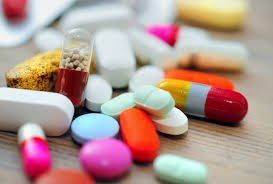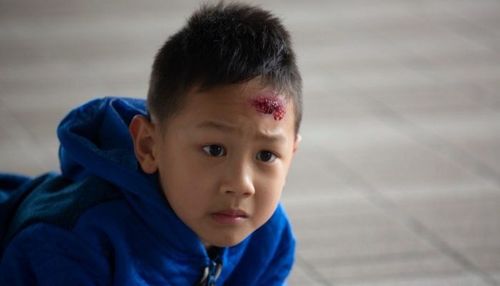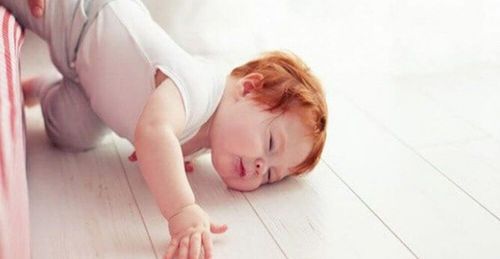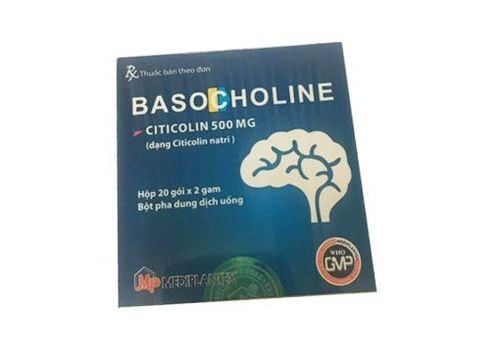This is an automatically translated article.
The article was professionally consulted with Master, Doctor Truong Thanh Tam - Pediatrician - Department of Pediatrics - Neonatology - Vinmec Danang International General Hospital.Children are inherently hyperactive and do not realize the consequences, so they often fall. When a child falls to the ground, it may not cause too much damage depending on the case, but in some cases it can lead to serious head injury.
1. Causes of children falling and hitting their heads
Children fall for many reasons. Often, children fall and hit their head due to:Caregiver carelessness: Many parents or siblings fail to properly care for their children, causing them to fall from a bed, hammock, stroller or from above. down. Besides, carelessly when holding the child, letting the baby fall down can also cause pain or injury; Because children are naughty: Children can climb on tables, chairs or unstable objects, run and jump in wet places such as bathrooms, playgrounds that have just rained, freshly mopped floors, ... and fall and hit head; In addition, children can also play with each other, push each other and fall. Or they may fall and hit their head while playing sports (football, tug of war,...).
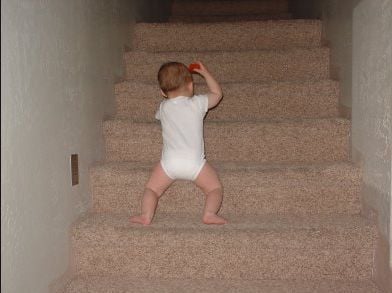
2. Is it dangerous for children to fall and hit their heads on the ground?
For children under 5 years old, the phenomenon of falling and hitting the head is quite common. However, because the head is a part that contains many important organs, parents should not be negligent when a child falls and hits his head.In fact, the majority of cases of collisions and falls simply when the baby is playing or falling from a low chair, low bed, ... are only minor injuries, skin such as slight bruising, scratches or sometimes bleeding blood from rubbing. Because the scalp is home to many blood vessels, when damaged, it can cause large bruises or cause a lot of bleeding.
According to the survey, out of 100 head trauma cases, only 1-2 cases can cause skull fracture. Most skull fractures cause headaches only at the site of the fracture and do not usually require intervention as they heal within a few weeks. However, there is still a potential risk in children who fall and hit their heads. Some complications can occur, which is damage to the inner brain, causing concussion.
The brain is a soft mass, protected by the outer skull bone and cerebrospinal fluid, which helps to reduce concussion and reduce trauma if any. When the head is subjected to a strong impact, the cerebrospinal fluid may not completely protect the brain, causing the brain to shake, hitting the hard wall of the skull and causing a concussion. Too much impact can cause the brain to bruise, bruise or even burst the blood vessels that feed the brain, causing cerebral hemorrhage. These complications can affect the patient's level of consciousness, nerves and even lead to death. This complication may occur after an injury or occur slowly after a few days or weeks.
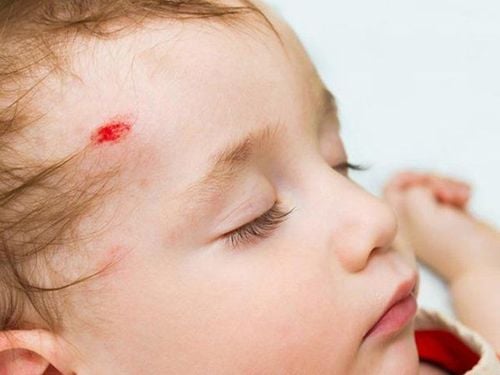
3. How to handle when a child falls and hits his head on the ground
Often, it is difficult to predict which brain injuries are benign and which are dangerous. There are some warning signs about the risk of brain injury in children that parents should pay attention to:Unconscious child: Even if a child is unconscious for only a few seconds, it is still important to pay attention because the impact force is strong enough. blood clot in the brain. At this time, it is necessary to bring the child to the medical center immediately; Consciousness disorders: If the child is still awake after a fall, but after a while there are abnormal signs such as lethargy, poor concentration, not recognizing loved ones, agitation difficult to calm,... need to quickly bring the child to a medical facility for examination; Vomiting more than 3 times: Usually, after a fall, even if there is no brain injury, a child can still vomit 1-2 times due to crying, coughing or the impact of the skull. However, if the child vomits more than 3 times, it is a warning sign that the baby may have a brain injury, needing to go to the hospital immediately. And in case of a premature baby, within the first few hours after a fall, only breast milk or water should be given to the child, not solid food; Sleep a lot: After a fall, children tend to sleep a lot. This makes it more difficult to monitor a child's abnormality. At this time, it is necessary to monitor whether the child has any abnormality in sleep; Loss of motor balance: After a fall, many children experience dizziness - this is a normal sign. However, if the baby loses balance when moving, or falls, drags his legs, loses his direction, etc., he should take him to the doctor immediately. Besides, parents should monitor whether the child can do everything when playing, such as sitting up straight, walking steadily. For children who do not know how to walk, monitor whether the baby is sitting, crawling normally, crying a lot,...;

4. First aid for children when they fall and hit their heads
Basic first aid instructions for children are as follows:If the child's head is bruised and swollen, apply ice at the swollen place for 15-20 minutes continuously. This helps keep the bruise from progressing and relieves pain. If the bruise is large, many, should apply ice again 1 hour later and do it regularly 2-3 times a day for 1-2 days later; If the child is found to be slightly scratched, wash the scratched area with clean water and mild soap; When you see that the child has little bleeding, should use a clean towel or clean medical gauze, press directly on the wound to stop the bleeding for about 10 minutes or until no more bleeding; If the child vomits 1-2 times, the child should rest and drink only water. If the child can drink water and does not vomit more, then after 1-2 hours, the child can eat normally; Let the child rest, closely monitor within the first 2 hours after the injury; If the child has local pain or headache, pain medicine can be given to the child as needed, but wait at least 2 hours after the injury before giving it. Waiting for about 2 hours to prevent the child from vomiting when taking the medicine. The drugs that can be used are Acetaminophen or Ibuprofen with the appropriate dose for the baby's weight and age. if the child still has a headache 24 hours after the injury, the child should see a doctor; With stable children, it is recommended to follow up 48 - 72 hours later to make sure there is no worry; Pay attention to follow up to see if the baby has a neck injury.
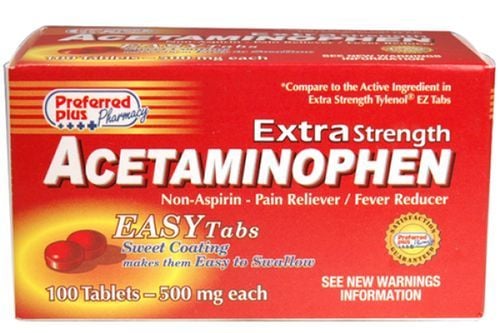
Heat the wound like applying a warm towel to the wound: Because when you fall, your blood vessels are bleeding, so hot compresses will dilate blood vessels, causing more blood to flow and causing severe and difficult bruising. heal better; Apply wind oil: Applying wind oil to the swollen area will make the wound worse because it causes some small blood vessels to bleed continuously; Moving victims in critical condition: Unnecessarily moving children can cause greater complications for injuries to the brain, spine, neck, etc.
5. Measures to prevent the risk of children falling and hitting their heads
Parents need to be careful when taking care of children, do not let children play alone, especially those who just learn to crawl, crawl, stand, walk,...; Should make screens where the child's bed lies and the way to the stairs, balcony, kitchen,...; Windows should have bars and be locked to prevent children from climbing on them; Children lying in a hammock or crib should be covered so that they do not fall to the floor when changing positions; The mattress should be spread at the foot of the bed so that if the child falls, it will not hurt; Children's hammock ropes need to be firm and gently shaken; When placing a child in a high chair or stroller, a harness is required; Do not leave the floor slippery or wet; Children under the age of 10 should not be left to look after children under the age of 3 alone; For older children of school age, it is necessary to explain to them the causes, consequences and ways to prevent accidents. If parents are subjective before the child falls and hit his head on the ground, not paying attention to the child's abnormal expressions, it can lead to serious consequences for the baby. Therefore, it is necessary to be careful in looking after and raising children, to avoid the risk of falls and injuries to the baby. At the same time, when you see that your baby has abnormal signs after a fall, you should take your baby to the doctor immediately.When a child shows abnormal signs of health, parents can take the child to Vinmec Health system for timely examination and treatment.
Vinmec International General Hospital is a high-quality medical facility in Vietnam with a team of highly qualified medical professionals, well-trained, domestic and foreign, and experienced.
A system of modern and advanced medical equipment, possessing many of the best machines in the world, helping to detect many difficult and dangerous diseases in a short time, supporting the diagnosis and treatment of doctors the most effective. The hospital space is designed according to 5-star hotel standards, giving patients comfort, friendliness and peace of mind.
Please dial HOTLINE for more information or register for an appointment HERE. Download MyVinmec app to make appointments faster and to manage your bookings easily.





